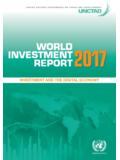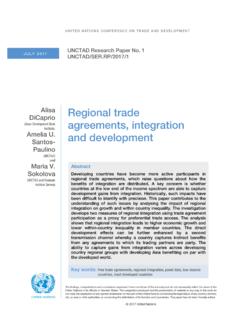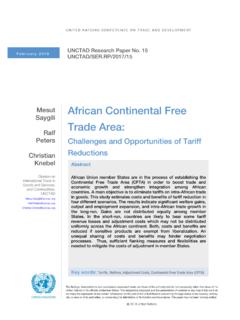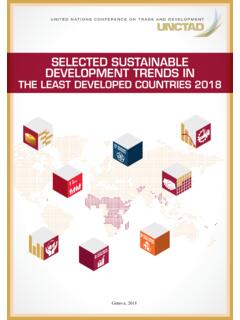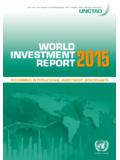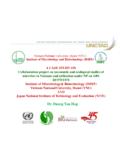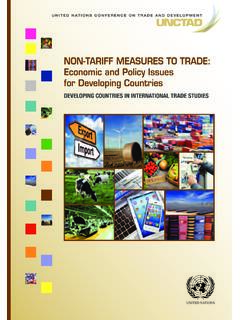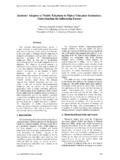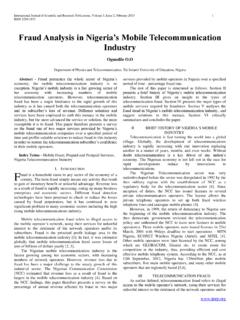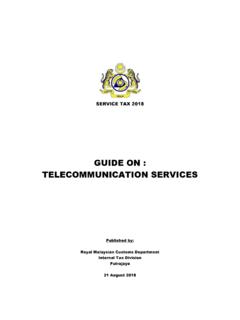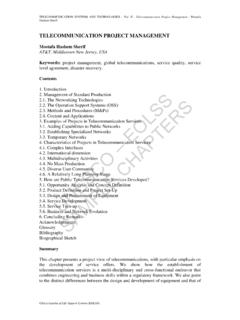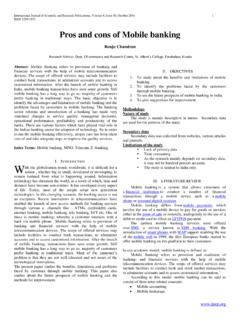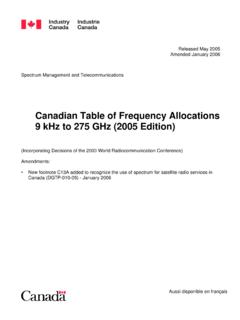Transcription of TELECOMMUNICATION IN ETHIOPIA - UNCTAD | Home
1 MULTI-YEAR EXPERT MEETING ON services , DEVELOPMENT AND TRADE: THE REGULATORY AND INSTITUTIONAL DIMENSION. Geneva, 17-19 March 2010. TELECOMMUNICATION IN ETHIOPIA . By Taye Estifanos DUBALE. Chief TELECOMMUNICATION Development Officer Ethiopian TELECOMMUNICATION Agency SOURCE: Ethiopian TELECOMMUNICATION Agency, ETHIOPIA TITLE : TELECOMMUNICATION in ETHIOPIA 1. Introduction Globally, the development of TELECOMMUNICATION industry is one of the important indicators of social and economic development of a given country. In addition to this, the development of communication sector plays a vital role in overall development of all sectors related to social, political and economic affairs. This sector is very dynamic in its nature of innovation and dissemination. Hence, it needs proper regulation like other critical economic sectors. Having this in mind, the Government of ETHIOPIA established The Ethiopian TELECOMMUNICATION Agency by Proclamation No.
2 49/1996, as a regulatory body for TELECOMMUNICATION services . The Agency is institutionalized with the objectives of promoting the development of high quality, efficient, reliable and affordable TELECOMMUNICATION services in the country. The Ethiopian TELECOMMUNICATION Agency (ETA) started its operation by giving license in four areas of services , namely, Public Switched TELECOMMUNICATION Network (PSTN), Cellular Mobile, Internet and Data communication services to Ethiopian TELECOMMUNICATION Corporation (ETC), which was established by Council of Ministers regulation No 47/1999. as an incumbent state owned operator. Currently, ETC is providing all types of services (PSTN, cellular Mobile, Internet and data communication services ) in all parts of the country. ETC has million subscribers, of which Fixed, mobile and Internet. Mobile telephone and internet services are being rendered since 1996 and 1997 respectively.
3 At present, Teledensity is and for fixed and Mobile respectively. The rate of penetration of telecom service of the country is among the lowest being compared with African countries and even among Sub-Saharan African countries. The government of ETHIOPIA has aggressively been moving and implementing development strategies aimed at reducing the poverty prevailing in the country. In this line, TELECOMMUNICATION plays a key role in facilitating the poverty reduction and development strategy being implemented by the government. To this end, the government has designed strategies to expand TELECOMMUNICATION national network infrastructure, and other infrastructures (roads and power) as well and as a result to increase socio-economic development of the country in general and telecom penetration rate in particular. ETA, being fully financed by the government, and is currently organized with a Director General and five Directorates namely, Licensing and Inspection, Standards and Type Approval, Legal and Consumers Affairs, Planning & TELECOMMUNICATION Development and Support Service Directorates.
4 2 BACKGROUND. Telecommunications service has begun in ETHIOPIA more than hundred years ago and used to be administered under the Ministry of Posts Telephone and Telegraph until 1952. 1 It was later separated from posts and became an autonomous entity under the Ministry by the enactment of TELECOMMUNICATION Proclamation No. 131 of 1952. By this proclamation, a TELECOMMUNICATION entity, called "Ethiopian TELECOMMUNICATION Board" which exclusively regulates and operates TELECOMMUNICATION services was established. Without affecting its functions, the name was later changed to Ethiopian TELECOMMUNICATION Authority. The Ethiopian TELECOMMUNICATION Authority was working on an exclusive basis as an operator and regulator until the promulgation of proclamation No. 49/1996 (latter amended by proclamation No. 281/2002) that established a separate federal TELECOMMUNICATION regulatory entity called Ethiopian TELECOMMUNICATION Agency (ETA).
5 The government owned operator called the Ethiopian TELECOMMUNICATION Corporation (ETC) is also established by Council of Ministers Regulation No. 10/1996. While ETA is responsible, inter-alia, to license TELECOMMUNICATION service operator(s), specify technical standards, type approval of equipment, license radio communication equipment and manage and authorize the use of frequencies, ETC is responsible to operate TELECOMMUNICATION services , to repair, assemble and manufacture telecommunications equipment and to render telecommunications training services . Both ETA and ETC are accountable to the Ministry of Transport and communication (MoTAC) which is responsible for policy issues. The TELECOMMUNICATION industry in ETHIOPIA is currently fully owned by the government. The government owned operator, the Ethiopian TELECOMMUNICATION Corporation (ETC), provides PSTN, Mobile telephone, Internet and data communication services .
6 Currently, ETC has million subscribers, of which Fixed, mobile and Internet. Mobile telephone and internet services are being rendered since 1996 and 1997 respectively. Teledensity is , for fixed and Mobile respectively. The rate of penetration of telecom service of the country is among the lowest being compared with African countries and even among Sub- Saharan African countries. ETA has started its operation in 1999 with the purpose of having a separate regulatory organ which is found to be necessary to make the TELECOMMUNICATION service more efficient and reliable. One of the duties and responsibilities of ETA is to license TELECOMMUNICATION service provider. Accordingly, it has issued license for ETC for four services , namely fixed telephone, mobile telephone, Internet and data communication services in July 2002. ETA. has also commenced quality control activities and has started evaluating the operator's performance on the basis of the license agreement.
7 ETA has been setting and approving standards for TELECOMMUNICATION equipment. In addition, since its establishment ETA has been allocating frequency for spectrum users. As per the amended proclamation No. 281/2002, the Agency is issuing licenses for the private sector on TELECOMMUNICATION services such as resale, cabling, terminal equipment maintenance and exchange installation. 3. Institutional Arrangement As the historical development process of the communication industry, the sector demanded the importance of the separation of the telecom policy, regulation and the operation. Globally, the number of independent regulators increased from time to time, its number was 13 in 1990. and 112 in 2001 and so on. This approach was believed to improve sector performance. In this direction, the Ethiopian Government has taken the basic step in separating the three functions stated above. To this end, policy matters are left for government/Ministry of 2 Transport and Communication (MoTAC), regulation is given to Ethiopian TELECOMMUNICATION Agency (ETA) and operation is given to Ethiopian TELECOMMUNICATION Corporation (ETC).
8 Both, the regulator and operator are accountable to the same body (Ministry of Transport and communication). 4. TELECOMMUNICATION Regulation Both economic theory and political practices recognize the need to regulate not only competition but also monopolies. It is important to note that monopoly in TELECOMMUNICATION is justified as being optimal for socio-political objectives, such as assuring universal access to the rural and remote areas to enhance national economic performance by effectively supporting important sectors such as education, investment and trade, etc. The Ethiopian TELECOMMUNICATION Agency (ETA) is institutionalized with the objectives of promoting the development of high quality, efficient, reliable and affordable TELECOMMUNICATION services in the country. The establishment of ETA is to institutionalize the implementation of government policies and directives. To this end, the following main Powers & Duties are given by the law to the ETA.
9 To specify technical standards and procedures for the provision of TELECOMMUNICATION services ;. To ensure that TELECOMMUNICATION services conform to the specified standards of quality;. To regulate tariffs relating to basic TELECOMMUNICATION services ;. To License and supervise operators of TELECOMMUNICATION services ;. To regulate types of TELECOMMUNICATION equipment which may be connected to a TELECOMMUNICATION system;. To authorize and supervise the use of frequencies allotted to ETHIOPIA Accordingly, it has issued license for ETC for four types of services , namely fixed line, mobile, Internet and data communication services in July 2002. ETA has also commenced quality control activities and has started evaluating the operator's performance on the basis of the license agreement. It has been allocating radio frequencies for frequency licensees and monitoring and evaluation of the use of frequencies as well.
10 So far, the Agency has taken key regulatory measures to achieve policy objectives:- Introduction of license for the government operator to render four types of service, namely Fixed, Mobile, Internet and Data communication, Directives on radio regulation, VAS directives, Directives on licenses of Telecenter, Cabling, Maintenance, switching services , and, Rural Connectivity Project strategy 4. TELECOMMUNICATION services Environment in ETHIOPIA ETHIOPIA is located in Eastern Africa. The country has a size of million square kilometers with an estimated population of over 76 million. ETHIOPIA , as one of the largest and populous countries in Africa has the lowest telecom density. At present, the telecom density is and for fixed line and mobile, respectively. TELECOMMUNICATION market in ETHIOPIA is still owned by the government. The state-owned public enterprise, Ethiopian 3 Telecommunications Corporation, is the sole telecommunications services provider in ETHIOPIA .
